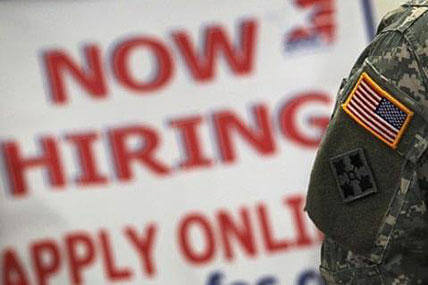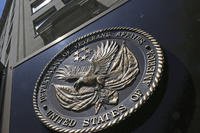The unemployment rate for veterans who served after 9/11 remains stubbornly high despite public and private programs aimed at easing their transition to the civilian job market.
The job market is tough for many former servicemembers -- even for those with the drive that earned them the Medal of Honor.
Figures released by the Bureau of Labor Statistics showed that the jobless rate for Iraq and Afghanistan vets was 10 percent in October, down slightly from the 10.1 percent rate in September, but the same as the 10 percent recorded on Veterans Day 2012.
A Defense Department panel on employment last week noted that the culture shock of separating from the military and immediately jumping into a demanding job market can be frustrating for a vet.
"There aren't too many jobs out there for snipers," joked one of the panelists, Dakota Meyer, who received the Medal of Honor for his actions as a Marine corporal at the 2009 Battle of Ganjgal in Afghanistan.
The 25-year-old Meyer, who has drifted in and out of jobs since leaving the Marine Corps in 2010 and been treated for post-traumatic stress, said that "veterans bring so many skills to the table, companies need to realize that."
Another Medal of Honor recipient, former Army Staff Sgt. Clint Romesha, said he prepared for separating with his sergeant’s attention to detail, but the adjustment was still difficult.
"It was really scary to make that transition," said Romesha, who was awarded the medal for his valor in the 2009 battle at Combat Outpost Keating in Afghanistan. "I utilized the great programs the Army has, but there's no magic wand that makes sure you cover your bases," he said.
Romesha had noted the experience of other soldiers transitioning out: "Two months to ETS [Estimated Termination of Service] and they have nothing lined up. You have to have a goal to take out into the world, especially in this economy."
In his preparation, Romesha became aware that employment rates for vets can vary widely among the states. He and his wife were from California but his brother-in-law, who worked in the energy sector, told them there were jobs to be had in the booming oil economy of North Dakota. They settled in Minot, N.D., where Romesha now works as a safety specialist for an energy company.
Overall, vets tend to do better than their civilian counterparts on employment, the Bureau of Labor Statistics said. The unemployment rate for all vets in October rose to 6.9 percent compared to 6.5 percent in September, while the national average for veterans and non-veterans was 7.3 percent, the BLS said.
The unemployment rate for 9/11-generation vets was 9.6 percent for men and 11.6 percent for women. The demographics overall rate of 10 percent also represented a significant increase from the 7.2 percent recorded in June, the lowest since 2008.
At the time, many analysts attributed the drop to efforts by the White House, corporations and non-profits to encourage employers to hire young workers just out of the military.
Labor Secretary Thomas Perez, who joined Meyer at the Department of Labor forum last week, said that vets receive priority for counseling and job placement at more than 2,600 of the department's American Jobs Centers nationwide.
Vets bring "the essential skills that companies are looking for: leadership, problem-solving and teamwork," Perez said.
The businesses that recruit and hire veterans have the bottom line in mind, Perez said. They employ vets "because they know it's as sound a business decision as they can make," he said.
However, the state of the economy and political gridlock in Washington can often frustrate the best intentions of the government and the private sector when it comes to hiring vets.
During the government shutdown last month, the Pentagon had to postpone more than 40 Transition Assistance Program workshops on jobs and benefits for about 1,400 separating servicemembers, according to the White House Office of Management and Budget.
The federal government, which has been a reliable employer of vets, has also been shedding jobs.
In its October jobs report, the BLS said federal employment had declined by 12,000 jobs for the month, not counting the hundreds of thousands of federal employees who were furloughed during the shutdown. Over the previous 12 months, federal employment had dropped by 94,000 jobs, the bureau said.
In his weekly radio address, President Obama said, "If you fight for your country overseas, you should never have to fight for a job when you come home."
Obama added, "I've made sure the federal government leads by example, and since I took office, we've hired about 300,000 veterans to keep serving their country."
"Our new transition assistance program is helping veterans and their spouses find that new job and plan their career," he said, "and I'm going to keep calling on Congress to do the right thing and pass the Veterans Jobs Corps -- put our veterans to work rebuilding America."
Obama also noted the efforts of his wife, First Lady Michelle Obama, and Dr. Jill Biden, the wife of Vice President Joe Biden, in their "Joining Forces" campaign to find jobs for vets.
"They've already hired or trained 290,000 veterans and military spouses, and they've committed to hiring over 400,000 more," Obama said of the effort.
In a promotional video he made for the Army's Career and Alumni Program, Romesha called on the business community to take another look at the 300,000 servicemembers who join the civilian job hunt each year.
"I can tell corporate America on hiring a vet that you get such a quality employee out of the deal and the American soldier is resilient and those qualities and skills are something you just don't want to pass up to help your own organization continue to progress with great soldiers that are now great employees," Romesha said.
He also called on his brothers and sisters in uniform to think of civilian life as "continuing on with service, just in a different uniform."






























